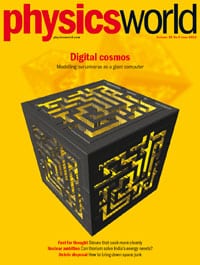By Matin Durrani

For any publication, it is never wise to spend too much time talking about itself. In the case of Physics World, our main aim is to reflect and report on the breakthroughs, events, personalities and issues in the global physics community – and to do so in a timely, accessible, accurate and entertaining way. Still, it seems churlish for me not to highlight the fact that Physics World has been named “best magazine” in the “professional association or royal college” category by MemCom – a UK-based organization that supports membership societies, charities and not-for-profit bodies.
As for the new issue, which is just out, my pick this month is the wonderfully written feature by Pablo Arrighi and Jonathan Grattage on the idea that our universe can be modelled as a giant computer. Their article is mind-boggling and certainly raises as many questions as it answers. You can read the article here but to enjoy the article and images in all their glory, remember that members of the Institute of Physics (IOP) can access the entire new issue online free of charge through the digital version of the magazine by following this link or by downloading the Physics World app onto your iPhone or iPad or Android device, available from the App Store and Google Play, respectively.
Here’s a rundown of other highlights of the issue.
• India sticks to the thorium trail – A three-stage plan that will see India generate nuclear power from its vast reserves of thorium is gaining ground, but huge challenges remain ahead, as Matthew Chalmers reports.
• The only woman in town – As the only female physics faculty member based at the University of Tokyo, Mio Murao talks to Michael Banks about the challenges Japan faces in getting more women into the subject.
• Quantum guidebooks – Fresh from his appearance in the latest Physics World podcast, which examined the enduring popularity of books about quantum mechanics, Robert P Crease surveys the many tour guides to the quantum world.
• Fixing the climate – While nations attempt to limit global warming by reducing carbon emissions, Colin Baglin argues that such actions will fail to solve the problem if geoengineering is not used in the short term.
• Bringing down the trash – The density of junk orbiting the Earth is at or near a critical value beyond which this man-made debris will self-perpetuate, forming many smaller pieces that are even more of a problem. Stephen Ornes reports on the latest ideas about how to bring down the trash.
• Now we’re cooking – From the very first oven to the foamed foods of modernist cuisine, physics has played a dominant role in food throughout history. But now the subject has the potential to solve a major global cooking issue, says Sidney Perkowitz.
• Changing the Hamiltonian – Trained to understand particles rather than people, physicists who become managers often struggle with human-resources challenges such as motivating and developing employees. Properly applied, however, a knowledge of physics can be a management boon, not a burden, as Graham Boyd demonstrates.
• Twin-tub theory – Kevin McGuigan recalls his near-horror with his mam’s washing machine.
If you’re not yet a member, you can join the IOP as an IOPimember for just £15, €20 or $25 a year via this link. Being an IOPimember gives you a full year’s access to Physics World both online and through the apps.



